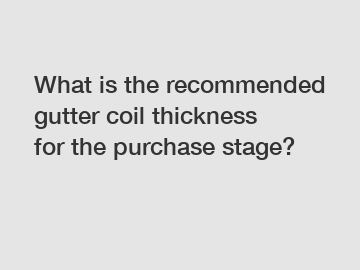What is the recommended gutter coil thickness for the purchase stage?
When it comes to purchasing gutter coils, one important factor to consider is the thickness of the coil. The thickness of a gutter coil determines its durability and ability to withstand various weather conditions. In this article, we will explore the recommended gutter coil thickness for the purchase stage, providing you with the information you need to make an informed decision.
Understanding Gutter Coil Thickness.
Gutter coil thickness is measured in gauge, with a lower gauge indicating a thicker coil. The most common gutter coil thicknesses available in the market are 0.027 and 0.032 gauge. While there are other thickness options, these two gauges are widely recommended due to their durability and suitability for residential and commercial projects.

Recommended Gutter Coil Thickness for Residential Projects.
For residential applications, the recommended gutter coil thickness is typically 0.027 gauge. This thickness is suitable for areas with moderate weather conditions and provides adequate strength and durability for most residential gutter systems. It is also more cost-effective compared to thicker gauges, making it a popular choice among homeowners.
Gutter Coil Thickness for Commercial Projects.
In commercial projects, where larger gutters and increased water flow are common, a thicker coil is often recommended. A 0.032 gauge gutter coil is generally preferred for commercial applications as it offers increased strength and stability, ensuring that the gutters can withstand heavy rainfalls and potential debris buildup. This thickness is more suitable for commercial buildings, factories, and warehouses where larger gutters are required.
Factors to Consider.
While the recommended gutter coil thickness provides a general guideline, there are additional factors to consider before making a purchase. These include:
1. Climate: If you live in an area with extreme weather conditions, such as heavy snowfall or frequent storms, opting for a thicker gauge may provide added strength and durability.
2. Budget: Thicker gauge gutter coils tend to be more expensive than thinner gauges. Consider your budget and the specific needs of your project when deciding on the thickness.
3. Building Code Requirements: Some regions have specific building codes that dictate the minimum thickness for gutter coils. Ensure compliance with these regulations to avoid any potential issues or conflicts.
4. Aesthetics: Thicker gauge gutters may appear bulkier and less visually appealing compared to thinner gauges. If aesthetics are a priority for your project, you may want to opt for a thinner gutter coil.
In conclusion, the recommended gutter coil thickness for the purchase stage depends on various factors, including the type of project, climate, budget, and building code requirements. For residential projects, a 0.027 gauge is usually suitable, while commercial applications often require a thicker 0.032 gauge. Consider these factors and consult with a professional if necessary to determine the most appropriate gauge for your gutter system.
For more information on gutter coil thickness or to discuss your specific project requirements, please contact us. We are here to help you make an informed decision and ensure your gutter system meets your expectations and needs.
Want more information on gutter coil for sale, prepainted aluminium coil, aluminum gutter coil supplier? Feel free to contact us.
155
0
0

Comments
All Comments (0)